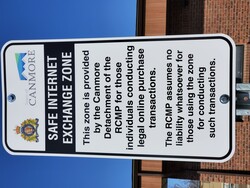
Victim Services
You are not alone. Get Support for Trauma
If you have been the victim of a crime, trauma, or tragedy, Bow Valley Victim Services can help by providing support, information, and referrals. Following a traumatic experience in which you are the victim, you may be overwhelmed, confused, and distrustful of others. Victim Services can help.
Contact
Phone 403.760.0197
Mailing Address Box 959, Banff, Alberta, T1L 1K3
Address - c/o Banff RCMP, 335 Lynx Street, Banff, Alberta, T1L 1K3

Safe Internet Exchange Zone
What it is
Did you buy something on Kijiji but don't feel comfortable going to someone's home to pick it up? Or, are you a seller and don't feel comfortable having someone meet you at your home? The Canmore RCMP has created a Safe Internet Exchange Zone to make internet sales feel safer for both buyers and sellers.
Where it is
The Safe Internet Exchange Zone is located in the front parking lot at the Canmore RCMP detachment, 101 Elk Run Blvd.
- Once you have agreed on a sale, you can set up your meeting place in the parking lot at the Canmore RCMP detachment (101 Elk Run Blvd). There is not a supervised site, and no appointments are required.
- The Safe Internet Exchange Zone is open 24/7, however, residents are to arrange exchanges during daytime hours. Officers will not be available to supervise these meetings or help people negotiate their sales.
- The RCMP assumes no liability whatsoever for those using the Zone for conducting online transactions.
- Don’t purchase anything while using public Wi-Fi. Shop using your own data connection or a trusted network.
- Watch your financial statements for any unauthorized purchases.
- Be sure to use strong passwords.
- If a deal is too good to be true, it probably is.

Community Watch
Building Safe Communities
Crime happens in Canmore. Together, we can look out for ourselves, loved ones, and greater community to promote safe neighbourhoods. Here are some tips and guidelines for fostering a feeling of safety in your neighbourhood and what to do if you notice something suspicious.
Knowing your neighbours is an important part of helping to maintain a safe community. You get to know their regular patterns so that you can see when something is unusual. Particularly in Canmore, with the number of part time residents, knowing the patterns of your neighbours is essential.
Make a point of reaching out to those neighbours that you don’t know. Visit our Neighbourhoods page - you’ll make new friends and help with the Canmore Community Watch Program.
We encourage residents to watch out for each other to reduce crime in our town. Community members are the eyes and ears of the community and should report any suspicious activity in their neighbourhoods, whenever they occur.
We can't stress enough the importance of reporting suspicious behavior. Sometimes, people are reluctant to call 911 about behavior that they feel is suspicious because they believe their call will be a burden or unnecessarily tie up police resources. In fact, reporting suspicious activity immediately can help police prevent or interrupt crime.
What is suspicious behavior?
- Unusual noises, including screaming, sounds of fighting, breaking glass
- People in or around buildings or areas who do not appear to be conducting legitimate business
- Unauthorized people in restricted areas
- Vehicles driving slowly and aimlessly through neighborhoods, around schools or parking lots
- People peering into parked vehicles that are not their own
- People who change their behavior when they notice they have been seen
- People dressed inappropriately for the weather or occasion, (i.e., heavy coat in warm weather)Abandoned parcels or other items in unusual locations (i.e. in a lobby or elevator)
When to report suspicious behavior? We urge you to call 911 when:
- You believe someone is in physical danger
- You believe a specific crime is happening
- You believe something is suspicious
What makes it suspicious? Be able to explain to the 911 call taker why the behavior you are seeing/hearing is suspicious. What gives you the feeling that a crime is in progress or about to occur? Don't doubt your instincts. Call 911 and let our call takers evaluate and respond to the information you provide.
- Height, weight, build and posture
- Hair colour, length, wig, cap, hat, ski mask, stocking mask, baseball hat
- Sex
- Age
- Eye colour, glasses
- Race, colour of skin
- Nose, lips, teeth, ears, hearing aid, facial jewelry, facial hair
- Voice, language, accent, lisp
- Unusual facial features, cleft chin
- Scars, marks, tattoos, amputations, deformities
- Right or left-handed, wearing watch, rings or bracelets
- Gun, knife, club, or other weapon
- Clothing length and colour, jacket, necktie, shorts, pants, skirt
- Name if heard called out
- Carrying anything
- Shoes, colour, and types
When noting a license plate record it immediately but pay attention not only to the plate number but also the province or state and if it cannot be determined, note the colour and description of the plate.
Criminal Record Checks
Criminal record checks are done at the RCMP detachment: 101 Elk Run Blvd, Monday to Friday from 8 a.m. to 4 p.m.
A Name-Based Criminal Record check is a query, based on name and date of birth, of active criminal files in the RCMP National Repository of Criminal Records used to determine the possible existence of a criminal record. Generally used as a preliminary search only to determine if a Fingerprint-based Criminal Record check may be required. The query may also include a search of court records and a query of records management systems in other police agencies’ jurisdictions through the Police Information Portal (PIP) or other data sharing systems.
A Vulnerable Sector check is a name-based criminal record check (or police information check) plus a check to see if a person has a record suspension (pardon) for sexual offenses. The information that can be legally disclosed is provided to the applicant. In some cases, the applicant will be required to submit fingerprints for identity confirmation.
All Basic and Vulnerable Sector Criminal Record checks for employment incur the following fees:
- Residents of Canmore – $35 fee payable by debit or credit
- Residents of Exshaw, Deadman’s Flats, Harvie Heights, or Lac Des Arcs – No charge
All Criminal Record checks for volunteer purposes are supplied at no cost, where a volunteer letter is provided. This includes Vulnerable Sector checks requiring fingerprints for volunteer positions. Volunteer work is charitable work where individuals are not paid or compensated for expenses. It does not include volunteer work that is ordered by a court or a judicial body.
- The name and address of the organization that requires the screening
- Your name
- The reason for the screening (e.g., coach, etc.) and where a VS check was requested, who you will be working with (children, seniors, etc.)
- A statement that you will not be paid for your work nor compensated for any expenses
The fees for Digital Fingerprinting, payable in CASH ONLY, are as follows:
|
No Fee |
$50 Cash Fee |
|
You are applying for Canadian citizenship
|
You are adopting a child, in Canada or overseas |
|
You are applying to immigrate to Canada |
You are traveling and need a visa, a US Waiver, or a border crossing document |
|
You are applying for a job in the federal government (as requested by the departmental security officer) |
You are applying for a job with a private business or the municipal/provincial/territorial government |
|
You are applying to join a Canadian police force (when requested by the police force) |
You are applying for a record suspension (formerly pardon) |
|
You are making a request under the Privacy Act
|
You are applying for student placement |
|
You are applying to do volunteer work in Canada
|
You are applying for a name change |
|
|
You are living in a house where everyone requires a vulnerable sector check (e.g. home day care centre) |
|
**There is a $25 cash fee applicable if an applicant requires ink fingerprints |
You are sponsoring a family member to come to Canada |
Note, a Vulnerable Sector check for employment purposes that requires fingerprints will result in a total cost of $85. $35 (payable by card) for the local records check and $50 (cash only) for the fingerprinting services.
When applying for any type of Criminal Records check, the applicant must provide two pieces of identification, one of which must be government-issued photo ID.
- For Name Based or Vulnerable Sector checks, applicants must present proof of a local address.
- For Certified Criminal Records checks, please bring all paperwork provided to you by the organization requesting the check.
- All applications must be brought in by the applicant.
